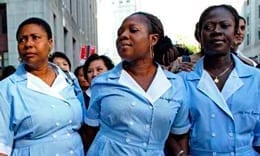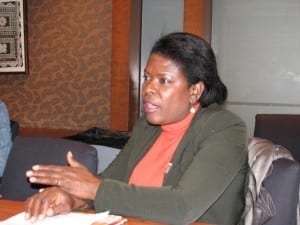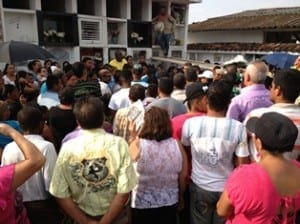May 13, 2013

Afro-desendent women gathered in Medellin, Colombia, in April for the first domestic workers union congress. Credit: IDWF
In Colombia, “even when there’s an improvement in the overall economy, women don’t see any improvement,” says Sohely Rua Catañeda. As a result, many women who are unable to secure formal employment are forced into the informal sector to support themselves and their families, laboring as domestic workers or street vendors. Women in these low-paying jobs have limited or no access to social services and are unable to address workplace harassment or unsafe working conditions.
Rua Catañeda, secretary of women and labor at the Escuela Nacional Sindical(National Union School, ENS), Colombia’s pro-worker think tank, recently met with Solidarity Center staff and others to discuss current ENS research on women in the Colombian economy. The Colombian labor market is “a reflection of discrimination,” she says, a statement she bolsters with ENS research that points to cultural factors blocking women’s economic advancement.
Only 8.5 million of the 18.2 million working age women have jobs—compared with 12 million working age men who are employed—and the vast gender gap in workforce participation is largely due a type of cultural discrimination in which employers seek women who fit a certain ideal. And that ideal, says Rua Catañeda, is one that frequently excludes Afro-descendent women, those who are over age 40 and those without the financial resources to buy new clothes or get manicures.
“There’s a lot of pressure for women to invest in their outer appearance for jobs. Afro-descendent women will never have an opportunity for these jobs,” Employers’ preferences for blonde women with straight hair requires women to spend a lot of time “conforming to an image that is really not what we look like.”
Seeking to improve the conditions of low-wage women workers, ENS is working to connect women with unions to strengthen their voice on the job so they can collectively improve wages and working conditions. ENS works closely with the Solidarity Center to support the Afro-Colombian Labor Council (Consejo Labor Afrocolombiano), founded last year by Afro-Colombian labor leaders and Colombian trade unions to advance racial inclusion in the labor movement and in Colombian society. Afro-Colombians comprise more than three-quarters of the country’s poor. Since then, Afro-Colombian women launched the Union of Domestic Service Workers (Unión de Trabajadoras del Servicio Domestíco, UTRASD) in Medellin, the first-ever union in Colombia created entirely by Afro-descendent women.
Rua Catañeda says the first step toward opening the labor market to women is to convey the extent of the problem to the Colombian public. Colombians, who see many women working in public places, think they have plenty of access to jobs, she says. Further, many women’s groups have focused on individualist, entrepreneurial solutions which in the past 10 years have seen few results.
But such solutions have not gone far to address most women’s economic struggles. “What you have are a lot of really tired women who have put a lot of work into their jobs and are poorer than ever before.”
Although recent legislation improving worker rights has passed, Rua Catañeda says technical and other reasons have prevented beneficial legislation from being enforced—making women’s increased membership and involvement in unions all the more critical
Apr 8, 2013

UTRASD President Maria Roa Borja seeks to increase membership to better defend domestic workers’ rights. Photo: Borja Facebook page
Afro-Colombian women recently launched the Union of Domestic Service Workers (Unión de Trabajadoras del Servicio Domestíco, UTRASD), the first-ever union in Colombia created entirely by Afro-descendent women.
UTRASD President Maria Roa Borja says she hopes to increase the union’s membership so it can become a powerful actor in defense of domestic workers’ rights. “I am going to give this all my effort … for all Afro-Colombian women, so that the union moves forward and all the rights of all Afro-Colombian women are valued here in Colombia,” Borja told news channel TeleMedellín. The new union was formed through the support of two Colombian nongovernmental organizations, Escuela Nacional Sindical (ENS) and Corporación Carabantú, and the Solidarity Center.
Some 236,000 Afro-Colombians live in Medellin, Colombia’s second largest city. Of these, half are women, many of whom moved to the city in search of economic opportunities. An in-depth study of female domestic workers in Medellin by ENS and Corporación Carabantú, found that nearly a quarter of those interviewed were victims of forced displacement. Further, nearly 98 percent of domestic workers interviewed are single heads of households with children.
“These women suffer from triple discrimination, and in the case of Medellin, almost a quarter are displaced from their territories, which puts them in a situation of greater vulnerability,” Ramon Perea, director of Carabantú, told ENS. “But it is in the workplace that they experience the greatest discrimination.” Domestic workers are especially vulnerable to workplace abuse. Around the world, between 50 million and 100 million people—the vast majority of them women—labor as domestic workers.
The study found that 85 percent of respondents do not have written work contracts. Most are not paid the legal minimum wage nor do they receive overtime. More than half of the women surveyed reported racial discrimination at work.
Apr 1, 2013

Colombia’s sugarcane workers are often hired on a contract basis, leaving them vulnerable to employer exploitation.
Sugarcane workers at the La Cabaña plantation in Valle De Cauca, Colombia, are taking part in a peaceful protest to seek recognition of their rights as workers. More than 100 workers at the La Cabaña plantation have been fired since forming a union in November, and another 500 have been forced to disaffiliate to retain their jobs, according to the union.
Management has refused to recognize the union, Sintrainagro, or bargain collectively with the 600 primarily Afro-Colombian workers. The union, affiliated with the Central Unitario de Trabajadores (CUT), has made several unsuccessful attempts to negotiate with the company and has engaged in talks with the Ministry of Labor, which promised to investigate the situation but has yet taken no action, according to the union. Union leaders say this is a clear violation of the 2011 Colombian Labor Action Plan, in which the Colombian government committed to lead legal reforms to prevent labor intermediation that prevent unionization of workers and protection of worker rights.
Sintrainagro is a member of the International Union of Food, Agricultural, Hotel, Restaurant, Catering, Tobacco and Allied Workers’ Associations (IUF), which reports that La Cabaña is the only major plantation in the area that has refused to hire workers directly after sugarcane workers waged a major strike in 2008 seeking formal work contracts with living wages and improved job safety and health.
Mar 12, 2013

Agripina Hurtado discusses the goals of the new Afro-Colombian Labor Council. Credit: Tula Connell
Afro-Colombians are far likelier than other Colombian workers to earn less than the minimum wage and to be employed in jobs where they cannot form unions to improve their working conditions. And all of this exclusion “has a strong current of racial discrimination under it,” said Agripina Hurtado, the newly elected president of the Afro-Colombian Labor Council (Consejo Labor Afrocolombiano). A quarter of Colombia’s population is Afro-descendant, yet Afro-Colombians comprise more than three-quarters of the country’s poor.
Many Colombians neither recognize nor acknowledge discrimination against Afro-descendants, Hurtado said, and the council is working to raise awareness among lawmakers and the public about their working conditions. For instance, roughly 75 percent of the workforce in Colombia’s ports—primarily Afro-descendent—is employed under flexible non-labor contracts and consequently not allowed to join unions or bargain collectively.
Further, threats and violence against Afro-Colombian leaders and communities are causing high levels of forced displacement, especially along the Pacific Coast where large numbers of Afro-descendants live. Colombia is the deadliest country in the world for union activists, with 4,000 trade unionists murdered in the past 20 years, many of them Afro-Colombian. “The selective killing of union members is spreading fear” throughout the Afro-Colombian community, she said.
Founded in July 2012, the Afro-Colombian Labor Council seeks to promote the rights of Colombia’s Afro-descendent workers. The council includes representatives of the country’s three large trade union federations: the Unitary Workers Center, Central Única dos Trabalhadores (CUT); the Workers’ Confederation of Colombia, Confederación de Trabajadores de Colombia (CTC); and the General Workers Federation, Confederación General del Trabajo (CGT). The federations represent workers in the palm and sugar cane industries, as well as domestic workers, public-sector and port workers.
Hurtado said one of the council’s big goals is to ensure that port workers, sugarcane cutters and other workers who are currently hired casually or under subcontracting arrangements are hired under the formal labor contracts that the law requires. That way, they will be covered by the nation’s labor laws and allowed to collectively bargain with their employers. Some 65 percent of Afro-Colombians in the informal sector and 29 percent in the formal sector make less than the minimum wage, according to an in-depth study of the Afro-Colombian labor situation in four major Colombian cities by the National Union School (ENS), a Solidarity Center partner.
Speaking through a translator at the Solidarity Center in Washington, D.C., Monday, Hurtado said the government is taking steps to acknowledge the needs of Afro-Colombians, but only because of pressure from the international community. Overall, the government “doesn’t really take these issues seriously.” The council is working at the national and local levels of government to “insert the issue of racial discrimination into the discussion on wages and worker issues,” she said.
Hurtado, a leader of the public sector union USE (Union Sindical de Emcali), said one of the biggest obstacles is getting members of the Afro-Colombian community to self-identify as Afro-Colombians and join together to fight for their rights on the job and in their communities.
“We aren’t conscious we have these rights, and we don’t go out and fight for them. The government doesn’t recognize us because we are not organized.”
Hurtado and the Afro-Colombian Labor Council are working hard to change that.
Feb 5, 2013

Family and friends attend the funeral of slain trade unionist, Juan Carlos Pérez Muñoz. Credit: Robinson Cook
Juan Carlos Pérez Muñoz, a trade union member in Colombia, was gunned down last week on his way to board a bus to the Cauca River Valley where he worked in the sugarcane fields.
The death of Pérez, 30, a leader in the SINTRAINAGRO union’s struggle for living wages and decent working conditions at the La Cabaña sugar plantation, came just days after two rallies by sugarcane workers. The workers were protesting the firing of 87 employees of the La Cabaña and 24 employees Maria Luisa plantations. Since December, when the sugarcane workers collectively began pushing for workplace improvements through SINTRAINAGRO, workers have been subjected to threatening phone calls and other forms of harassment, and the company has refused to negotiate.
“Anti-union violence and the victimization of the workers is still growing,” the union federation CUT (Central Unitaria de Trabajadores de Colombia), said in a statement. In Colombia, “the rights of workers continue to be violated,” CUT Human Rights Director Alberto Vanegas Zuluaga, told Colombia Reports.
Sugarcane development is a thriving business in Valle del Cauca. Nearly half its cultivated area is devoted to sugarcane production as either raw sugar or ethanol, about one-third of it for export. Sugarcane cutters work as long as 14 hours per day and make as little as $200 a month. Because they are largely subcontracted, they receive no health care or pensions and must provide their own safety equipment—and have no recourse if they are injured on the job.
Colombia remains the deadliest country for union leaders and members. In 2012, 19 trade unionists were murdered and there were at least 10 attempted murders, according to the Colombian non-governmental organization, Escuela Nacional Sindical. The International TradeUnion Confederation (ITUC) says that although some efforts have been made to investigate these crimes, the majority of the cases reported by trade union organizations remain unsolved.
In recent meetings with the Minister of Labor and the Minister of the Interior, SINTRAINAGRO and CUT denounced the violence and threats to leaders and members of the sugarcane workers’ union and to SINTRAINAGRO’s national leadership and asked the governmentto provide protection. They made clear that without government protection, more unionists would be killed. Perez was gunned down a few days later, leaving behind his wife, Luz Aidé, and son.





